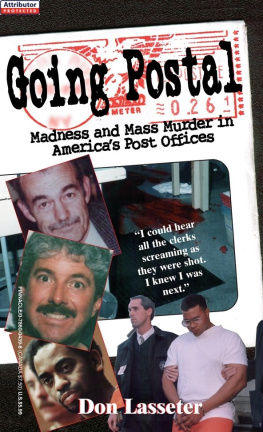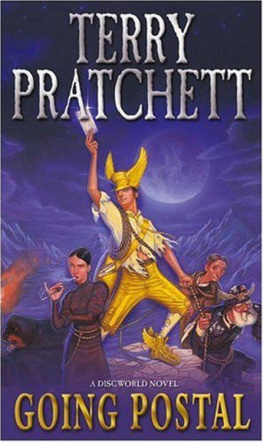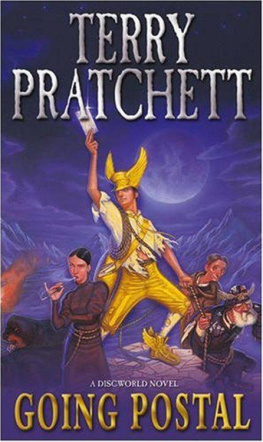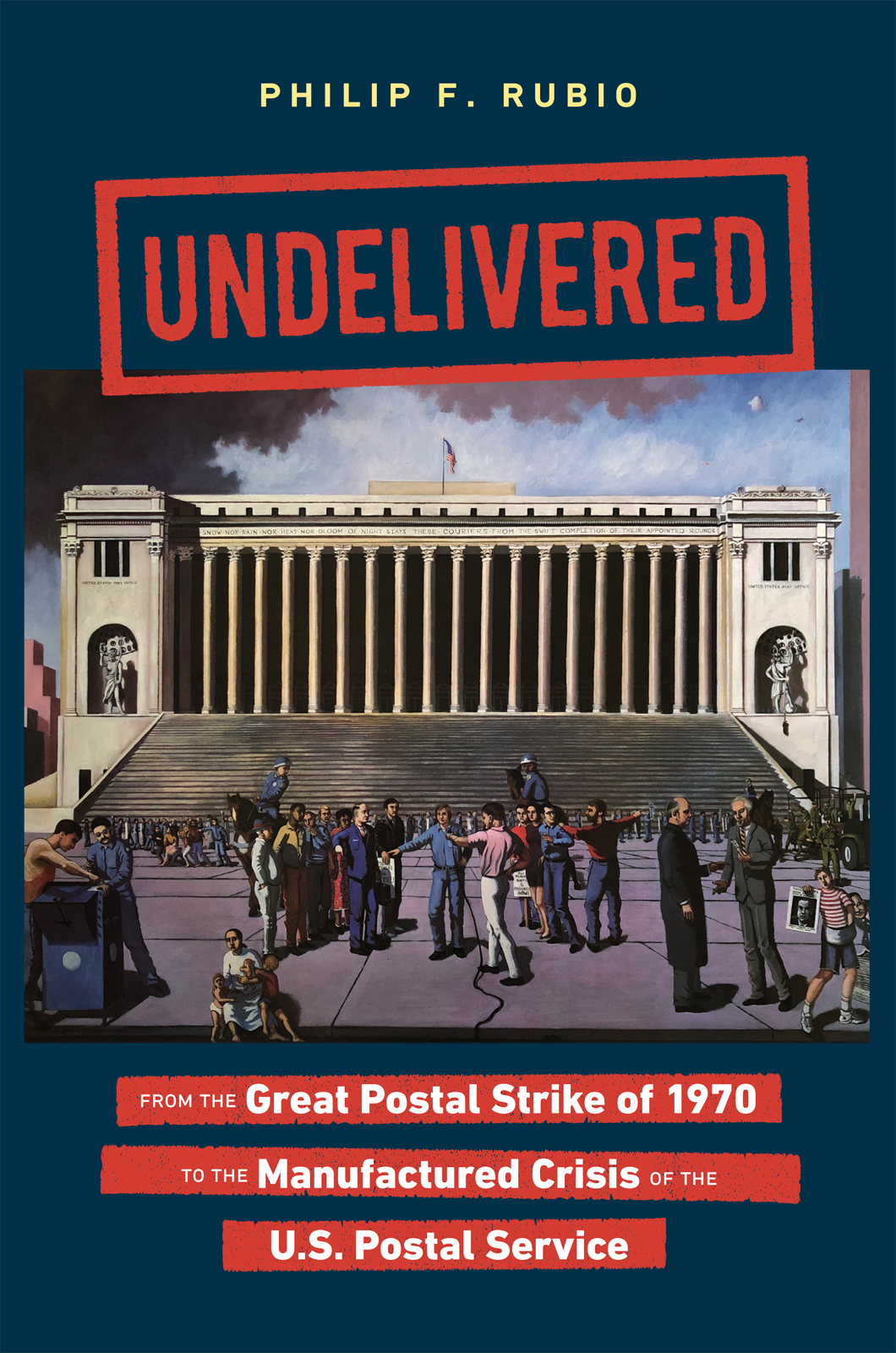UNDELIVERED
From the Great Postal Strike of 1970 to the Manufactured Crisis of the U.S. Postal Service
PHILIP F. RUBIO
THE UNIVERSITY OF NORTH CAROLINA PRESS
Chapel Hill
2020 The University of North Carolina Press
All rights reserved
Designed by Jamison Cockerham
Set in Arno, Scala Sans, Cupboard, and DIN Next LT by Tseng Information Systems, Inc.
Cover illustrations: Thomas Germano III, The Great Postal Strike 1970 (1995; oil on canvas, 58 66); title stamp typeface istockphoto.com/ Thomas Pajot.
Manufactured in the United States of America
The University of North Carolina Press has been a member of the Green Press Initiative since 2003.
LIBRARY OF CONGRESS CATALOGING-IN-PUBLICATION DATA
Names: Rubio, Philip F., author.
Title: Undelivered : from the Great Postal Strike of 1970 to the manufactured crisis of the U.S. Postal Service / Philip F. Rubio.
Description: Chapel Hill : University of North Carolina Press, [2020] | Includes bibliographical references and index.
Identifiers: LCCN 2019052213 | ISBN 9781469655451 (cloth) | ISBN 9781469655468 (paperback : alk. paper) | ISBN 9781469655475 (ebook)
Subjects: LCSH: United States Postal ServiceEmployeesHistory. | National Association of Letter Carriers (U.S.)History. | American Postal Workers UnionHistory. | Postal serviceEmployeesLabor unionsUnited StatesHistory20th century. | Postal serviceEmployeesLabor unionsUnited StatesHistory21st century. | Postal Strike, U.S., 1970.
Classification: LCC HE6499 .R84 2020 | DDC 331.892/81383497309047dc23
LC record available at https://lccn.loc.gov/2019052213
The appendix originally appeared as Thomas Germano, The 1970 Postal
Strike: An Artists Interpretation, Labors Heritage 7, no. 4 (1996): 1819.
Reprinted courtesy of AFL-CIO Collections. RG96-002 Photographic
Negatives, Charles Alexander Collection. George Meany Labor Archives, Special Collections, University of Maryland Libraries, College Park.
For Paula
CONTENTS
FIGURES
ABBREVIATIONS USED IN TEXT
| AFL-CIO | American Federation of Labor-Congress of Industrial Organizations |
| AMF | Airport Mail Facility |
| APWU | American Postal Workers Union (1971present) |
| BMC | Bulk Mail Center |
| CCA | City Carrier Assistant |
| CLUW | Coalition of Labor Union Women |
| CSC | Civil Service Commission |
| CSRS | Civil Service Retirement System |
| EEOC | Equal Employment Opportunity Commission |
| EPA | Equal Pay Act |
| GCSPO | Grand Central Station Post Office |
| GPO | General Post Office |
| LIUNA | Laborers International Union of North America |
| MBPU | Manhattan-Bronx Postal Union (NPU member) |
| MHA | Mail Handler Assistants |
| MPLSM | Multi-Position Letter Sorting Machine |
| NALC | National Association of Letter Carriers (1889present) |
| NAPFE | National Alliance of Postal and Federal Employees (1965present), formerly NAPE (National Alliance of Postal Employees, 19131965) |
| NAPOGSME | National Association of Post Office and General Services Maintenance Employees, 1947, merged into APWU in 1971 |
| NARMC | National Association of Railway Mail Clerks (defunct) |
| NASDM | National Association of Special Delivery Messengers, merged into APWU in 1971 |
| NASPOE | National Association of Substitute Post Office Employees (defunct) |
| NDC | Network Distribution Center |
| NFPOC | National Federation of Post Office Clerks (18991961), merged into UFPC in 1961, which merged into APWU in 1971 |
| NFPOMVE | National Federation of Post Office Motor Vehicle Employees, 1939, merged into APWU in 1971 |
| NPMHU | National Postal Mail Handlers Union (1912present) |
| NPTA | National Postal Transport Association, merged into UFPC in 1961, which merged into APWU in 1971 |
| NPU | National Postal Union (19601971), first called National Postal Clerks Union in 1959, merged into APWU in 1971 |
| NRLCA | National Rural Letter Carriers Association (1903present) |
| OCR | Optical Character Reader |
| P&DC | Processing and Distribution Center |
| PAEA | Postal Accountability and Enhancement Act, 2006 |
| PRA | Postal Reorganization Act, 1970 |
| PTF | Part Time Flexible |
| RMS | Railway Mail Service (18641977) |
| TE | Temporary Employee |
| UFPC | United Federation of Postal Clerks, (19611971), merged into APWU in 1971 |
| UNAPOC | United National Association of Post Office Clerks (later Craftsmen), 1899, merged into UFPC in 1961, which merged into APWU in 1971 |
| UPW | United Postal Workers, merged into UFPC in 1961, which merged into APWU in 1971 |
| USPOD | United States Post Office Department (17751971) |
| USPS | United States Postal Service (1971present) |
UNDELIVERED
Introduction
It all started in New York. It was 12:01 A.M. on Wednesday, March 18, 1970, when a handful of letter carriers from the National Association of Letter Carriers (NALC) Branch 36 and two members of the Manhattan-Bronx Postal Union (MBPU) set up a picket line at the Grand Central Station Post Office (GCSPO) on Forty-Fifth Street and Lexington Avenue in the midtown borough of Manhattan in New York City. Less than two hours earlier, hundreds of Branch 36 members had left the Manhattan Center on West Thirty-Fourth Street, where they had just voted to strike until Congress granted them a pay raise. Branch 36 was the largest in the NALC at over 8,000 members from Manhattan and the Bronx.
This was a wildcat strike, meaning it was unauthorized by the nine national postal unions. Those on strike for the next eight days could have been fired, fined, jailed, and had their unions decertified, because it was illegal to strike the federal government. Nonetheless, picket lines were spreading from New York into New Jersey, Massachusetts, Connecticut, Pennsylvania, Ohio, Illinois, Michigan, Wisconsin, Minnesota, Colorado, and California. Over 200,000 postal workers struck 671 post offices in dozens of cities and towns across the nation, including New York City, Albany, Buffalo, Boston, Worcester, Providence, Newark, Jersey City, Bridgeport, Hartford, New Haven, Philadelphia, Pittsburgh, Cleveland, Cincinnati, Toledo, Akron, Chicago, Milwaukee, Detroit, Grand Rapids, Minneapolis-St. Paul, Denver, San Francisco, and Los Angeles. And when it was over no one was fired.
From a handful of pickets in New York City to a nationwide strike, this grassroots labor action was transformational. It effectively forced collective bargaining on the administration of President Richard M. Nixon even before he signed it into law as part of the Postal Reorganization Act (PRA) on August 12, 1970, at the headquarters of the U.S. Post Office Department (USPOD) in Washington, D.C., just a few blocks from the White House. Surrounded by politicians, postal officials, and postal union leaders, Nixon, who had blasted the strikers just five months before, praised the law that created the U.S. Postal Service (USPS) that as a government/corporate hybrid would replace the USPOD on July 1, 1971, and provide a 14 percent wage increase to postal workers. The USPS would collectively bargain with the postal unions without whom, Nixon said, this reform could not have been accomplished. This is the American system working in a way that we all like to see it work, where we put the country above the party and where we put service to the people above any other interests. Nixon further foresaw better operation of this department better service [and] better working conditions and better pay over the years for the hundreds of thousands of people who work very proudly for the Post Office Department here in Washington and across the country.






